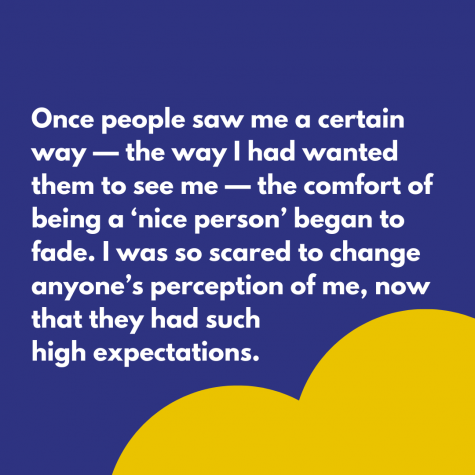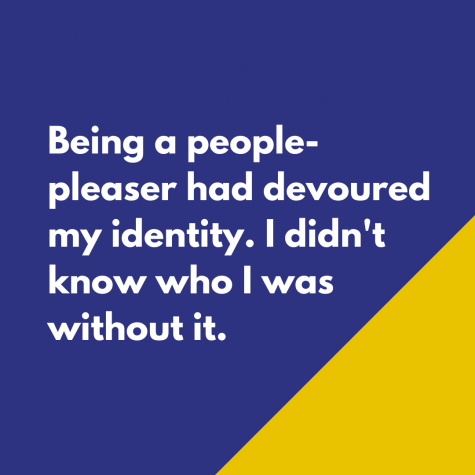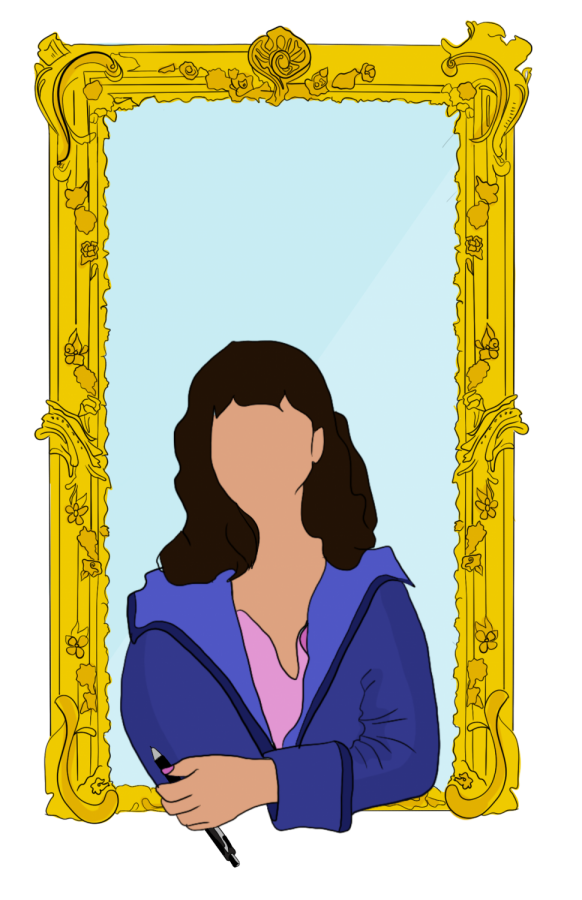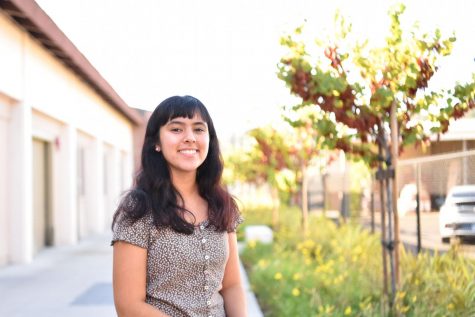In the Mirror: Anyone have a red pen?
Learning how to let go of being a people-pleaser
February 24, 2021
When I was in 5th grade, I carried an extra pen, pencil and eraser in my pencil pouch.
It wasn’t because I was the type of person that constantly lost my materials or anything like that. I carried them waiting for a particular moment — or rather, a particular line. Sometimes it came as a desperate whisper, other times a loud, carefree question, but no matter how it was said, I waited for the moment when someone would ask —
“Does anyone have an extra red pen?”
That was my moment. My purpose in that 5th grade classroom. If somebody needed an extra red pen, or wanted to borrow an eraser or pencil, I was their gal. Nobody needed to know that I held them solely for someone else, or that there was unparalleled satisfaction in knowing that people thought I was a nice person when I responded, “Sure, you can borrow mine!”
In hindsight, I was a really weird kid, wasn’t I?
Look, I just did it because I wanted to do a service. Well … and because I wanted people to think highly of me, knowing I was always there to lend a hand. That’s valid, right? Because if I didn’t, I would just be known solely as what many believed me to be: the teacher’s pet.
… Yeah. I was that kid. (You might be grimacing. Don’t worry, so am I.)

In my defense, it wasn’t like I went out of my way to suck up to my teachers all the time. But nobody could deny that teachers adored me, and whether in elementary school or high school, it’s a thin line to walk. When would it go from others scoffing at our teacher’s favoritism to glaring at me during recess? I didn’t want to find out.
There was really only one thing to do — get on everyone’s good side. It was the perfect scheme: I could easily be friendly and helpful by lending others my extra things. As long as I made sure that my classmates thought I was super nice too, nobody could sneer at me for being a goody-two-shoes. I wasn’t doing anything wrong.
Then there was the addictive quality to it, the rush of satisfaction in knowing I had pleased someone. Even a smile or a simple thank-you made me preen on the inside. Once in a while I would be complimented and daydream about it for the rest of the school day. I enjoyed doing what I could for other people, and soon the idea of acting like this became less about other people and more of just the way I was.
So I helped people with homework whenever I could. I was polite and inquisitive with my teachers and tried to always be kind to my friends. I lent people red pens, of course. I asked questions about people’s lives and complimented strangers. Making people happy made me happy. This was my thing now.
As time wore on, bits and pieces of my life slowly started to crack around me. You know how when you look back at your childhood, it genuinely feels like you didn’t have any problems or worries? Even though you were probably just too young to see it? It felt like all my problems really began once I started growing up. As I went from elementary to middle school, relationships with my friends became more strained. I started to keep more secrets, and my family life became stressful and confusing. What kept me going was the pride in how I acted when those around me were in need. It felt like I had a purpose, and I was sort of beating odds by persevering despite my life behind the scenes.
But once people saw me a certain way — the way I had wanted them to see me — the comfort of being a ‘nice person’ began to fade. I was so scared to change anyone’s perception of me, now that they had such high expectations. What if I didn’t want to seem happy and unaffected all the time? What if I couldn’t keep it up? But people liked me as I was, and being anything else was unfamiliar. I had to keep it up.
At this point, I know what you’re thinking. And you’re right.
Because eventually, things most definitely did go downhill. How long can you live for others before it consumes you?
It happened one day at a seemingly inconsequential moment: I was walking towards the middle school library and noticed there were people behind me, so of course, I held the door open for them, and then —
They all breezed right by. Not so much as a single muttered, “Thank you!”

The moment was minuscule, just normal middle-schoolers being absorbed in their own worlds, but it stung. It’s still embarrassing to admit, but I felt robbed. I hadn’t opened the door for them solely to be thanked — at this point it was more of an unconscious habit — and yet I had expected appreciation. I mean, didn’t I at least deserve a ‘thanks’?
The instance catapulted me into a state of confusion. I wasn’t supposed to be annoyed, I chastised myself. I wasn’t supposed to be kind for recognition. And if I had wanted some… was I even a nice person at all? Had I just been doing it for that instant gratification, the moral dessert?
Was I just a fake?
Being a people-pleaser had devoured my identity. I had no idea who I was without it. I had so badly needed to be likable that I didn’t have a personality at all.
The realization terrified me. Wanting to control others’ opinions of me had turned me almost manipulative, and I did not want to be like that. I had to stop.
I tried my best, determined to end my addiction to that moral dessert. Slowly, I started to do away with my attention-seeking actions. I learned I could be more blunt, and how to say “No” more frequently — and more importantly, that that was actually a good thing. As time passed, I got used to it, just as I had trained myself to automatically do what others wanted.
Without feeling like I needed to please anyone and everyone, I was able to regain the happiness that made me keep on acting like this in the first place. I truly did enjoy doing things for others, and I only did them when I really felt them and knew it didn’t matter what the response would be.
Now, I’m very aware of how I feel about something, whether I want to do it or not. My choices are my own, not just reflexive actions. Still, sometimes the people-pleaser in me causes me to overextend myself, or listen to my friends rant even as I’m yawning and glancing at the clock. But actually, now I don’t particularly mind, because we all carry that internal ache, that desire to be liked. But when it’s accompanied by the outside world constantly throwing us hurdles — grades, friendships, relationships, college, the future — it can only take a moment to be led astray, follow the path we think we should take and lose sight of who we really are.
Yet when you think about it, it’s all those things that life has thrown at us that’s made us who we are. It’s embarrassing to admit how much of a pushover and a suck-up I was, but without those experiences, I wouldn’t be as sure of myself as I am today. Our pasts can shape our present, rather than hold us back. Resilience and character development don’t come easy — but we can learn from ourselves.
So I no longer carry double the amount of pens, erasers or pencils just so someone will borrow them. I do, however, have a couple of highlighters that I never end up using, and an extra eraser because I always lose mine at the most annoying moments. But hey, if you ever rummage around in your backpack and your hands come up empty, well — you know who to ask.


















